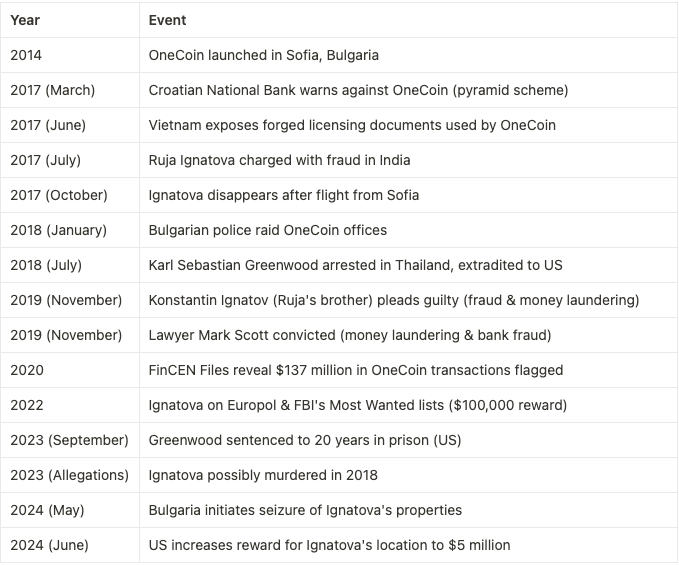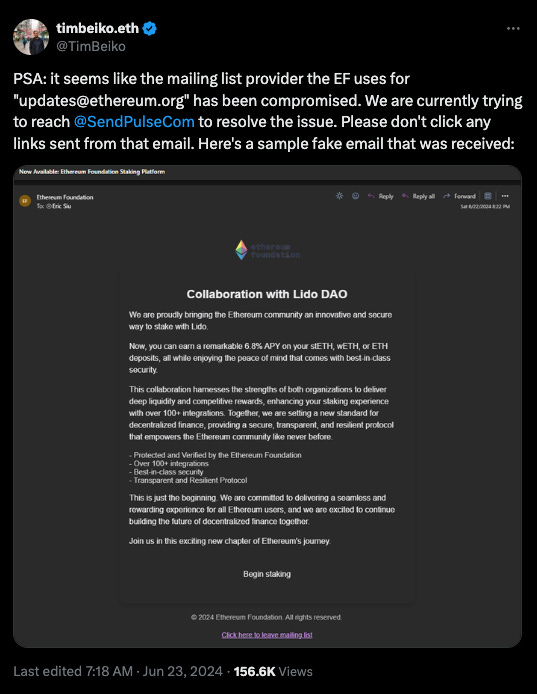Searching For Cryptoqueen 👸
Ruja Ignatova's new $5M bounty from FBI, is the Cryptoqueen dead? Crypto saved Julian Assange, says his brother. Vitalik's freedom tool. $500+M lost to hacks and fraud in Q2 2024. ETH ETF on July 4?
Hello, y'all. Have you heard the news? … 'Bout the little things.
Do try the Music Quiz Game 👉 Asset - Music Nerd
This is The Token Dispatch 🙌 find all about us here 🤟
Where’s the Cryptoqueen?
Murdered. Says BBC
Authorities still want her. Dead or alive.
The FBI hasn’t given up
The US Department of State is not buying any of this.
They are betting big on her capture.
Anyone with information leading to her capture can now claim $5 million, a stark rise from the previous $100,000 reward.
Authorities want Ignatova.
The FBI believes she may be using a German passport and hiding out in the Middle East or Eastern Europe.
Is she orchestrating her escape from the shadows?
The chase is far from over.
Who is Cryptoqueen?
Ruja Ignatova, the one who launched OneCoin in 2014
The promise? The next Bitcoin.
The reality? A colossal Ponzi scheme.
OneCoin was a complete sham, lacking the technology of a real digital currency.
Despite this, millions of investors worldwide poured over $4 billion into the scheme.
As authorities in the US and Germany started to close in, Ignatova vanished in October 2017.
She boarded a flight from Sofia to Athens and was never seen again. The FBI added her to their 10 Most Wanted list in 2022.
A Murder? The Taki Connection
Ignatova may have been killed by a Bulgarian mob boss she was connected to.
A BBC podcast sheds light on Ignatova's alleged ties to Hristoforos Amanatidis, aka "Taki," a Bulgarian drug kingpin. The investigation suggests Ignatova paid Taki for protection and potentially used OneCoin to launder money.
Leaked Bulgarian police documents claim she was murdered in late 2018 by order of Taki.
The documents, found in the home of a slain Bulgarian police officer, detail a gruesome scene: Ignatova killed on a yacht, her body dismembered and dumped at sea.
Several associates of Amanatidis reportedly back this narrative. They suggest Ignatova became a liability and Amanatidis silenced her permanently.
Luxury Lies
Co-founder Karl Sebastian Greenwood pleaded guilty to fraud charges in 2022, and Irina Dilkinska, a former OneCoin executive, followed suit in November 2023.
Ignatova and Greenwood, used investor funds to buy luxury properties in Dubai, laundering money through real estate. Greenwood is now serving a 20-year prison sentence in the US.
Read: The crypto crooks🪝
Here’s the timeline
Block That Quote 🎙️
Julian Assange’s half-brother, Gabriel Shipton.
“In short, it [crypto] saved his life”
Julian Assange's long legal battle is finally over.
His half-brother credits the crypto community with securing his freedom.
Read: Bitcoin Believer Is Finally Free 🕊️
“I have no doubt that [Julian] would not be where he is now if the AssangeDAO community hadn’t been so generous and raised so much money to contribute to his fight for freedom.”
AssangeDAO raised $53 million worth of Ethereum.
The crypto funds weren't just for legal fees.
“I did so many trips, flying to Washington and advocating for Julian in Congress …None of that would have been possible without AssangeDAO.”
The Assange family received a half-million dollar Bitcoin donation to cover Assange's post-plea expenses.
The Connection?
Satoshi Nakamoto, Bitcoin's creator, initially advised against it.
But, WikiLeaks used Bitcoin to accept donations when traditional finance blocked them.
This helped both: WikiLeaks got funds, Bitcoin gained exposure.
Freedom for One, Freedom for All?
“To a lot of people, to a lot of innovators, a lot of technologists, [Julian’s freedom] represents their freedom … He used technology and encryption and the architecture of the internet to spread truthful information.”
Shipton, has also refuted claims by blockchain security firms SlowMist and RescuETH that AssangeDAO might be involved in a "soft rug" scam.
Vitalik’s Freedom Tool
Ethereum co-founder Vitalik Buterin and economist Noah Smith discussed a thought:
Can authoritarian regimes leverage the internet's efficiency to outcompete liberal democracies?
Smith argues that the internet's ability to centralize data could be a boon for authoritarian governments. They can use it to:
Gauge public sentiment
Allocate resources efficiently
Respond swiftly to dissent (like China's reaction to the 2022 protests)
Buterin argues that the digital world offers unique defenses against authoritarian control:
Encryption and decentralised platforms: These provide robust protection for communication and data.
Fragmentation: Smaller online communities can foster better discourse compared to large, chaotic platforms like Twitter.
Buterin highlights blockchain technology's potential to:
Enable secure, anonymous communication: Tools like Rarimo's "Freedom Tool" allow voting without revealing identity, bypassing censorship in authoritarian states.
Create verifiable voting systems: Blockchain can ensure tamper-proof and transparent voting processes.
Both Smith and Buterin agree on the need for a more pluralistic online landscape. The goal is to create robust systems that:
Support healthy information ecosystems: Allow diverse voices to be heard without fear of retribution.
Make the internet less susceptible to manipulation: Develop tools that foster productive interactions between different groups.
In The Numbers 🔢
$572 million
Losses from scams and exploits across the web3 ecosystem in Q2 2024, research from blockchain security platform Immunefi.
$564,238,811 was lost to hacks across 53 specific incidents.
$8,450,050 was lost to fraud in across 19 specific incidents.
The total loss of Q2 2024 represents a 112% increase compared to Q2 2023, when hackers and fraudsters stole $265,481,519
Where are Ethereum ETFs?
We have a date: The Independence Day?
Anonymous sources told Reuters that talks between asset managers and the SEC are nearing the finish line.
We are looking at a July 4th approval.
Back in May, the SEC already approved the initial applications (19b-4 forms) for eight Ethereum ETFs.
Now, they're waiting on the final S-1 registration statements to become effective before trading kicks off.
Ethereum Inflating?
Ethereum's issuance of new coins has been on the rise for the past 73 days.
The longest inflationary period since the Merge in 2022.
This can be traced back to the Dencun upgrade in March, which introduced EIP-4844.
Read: Ethereum Turns Inflationary? 🐝
The leaked email
The Ethereum Foundation's email list was recently compromised. How?
A vulnerability in the Foundation's email service provider, SendPulse, was exploited.
Hackers used this breach to access the mailing list and send out phishing emails.
These emails appear legitimate, claiming to be from "updates@ethereum.org" and mentioning a collaboration with Lido DAO. However, they contain malicious links.
The Surfer 🏄
Former CEO of crypto project Hydrogen sentenced to over three years for securities fraud. Two former executives of Hydrogen Technology manipulated the price of Hydro tokens and defrauded investors.
Scammers took advantage of Blast's airdrop on Twitter, using tools meant for verified organisations. A suspicious link made its way into Blast's official Discord server before being removed by a moderator.
Coinbase is the most impersonated crypto brand by scammers, according to a recent survey. Phishing attacks using the Coinbase brand were reported in 416 incidents over the past four years.
If you like us, if you don't like us .. either ways do tell us✌️
If you dig what we do, show us love on Twitter and Instagram🤞
So long. OKAY? ✋













